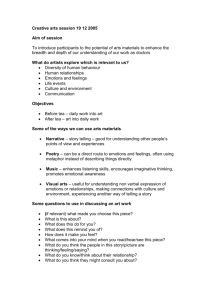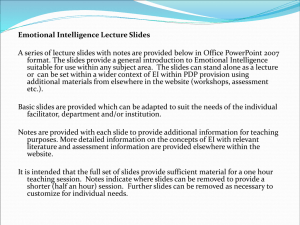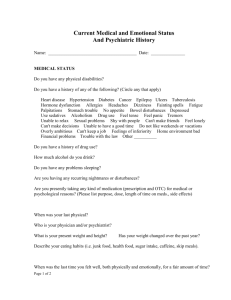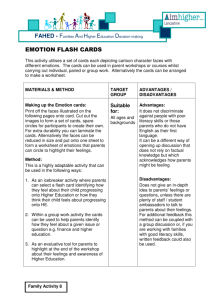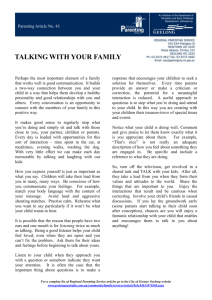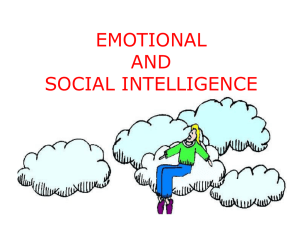Emotional Intelligence
advertisement
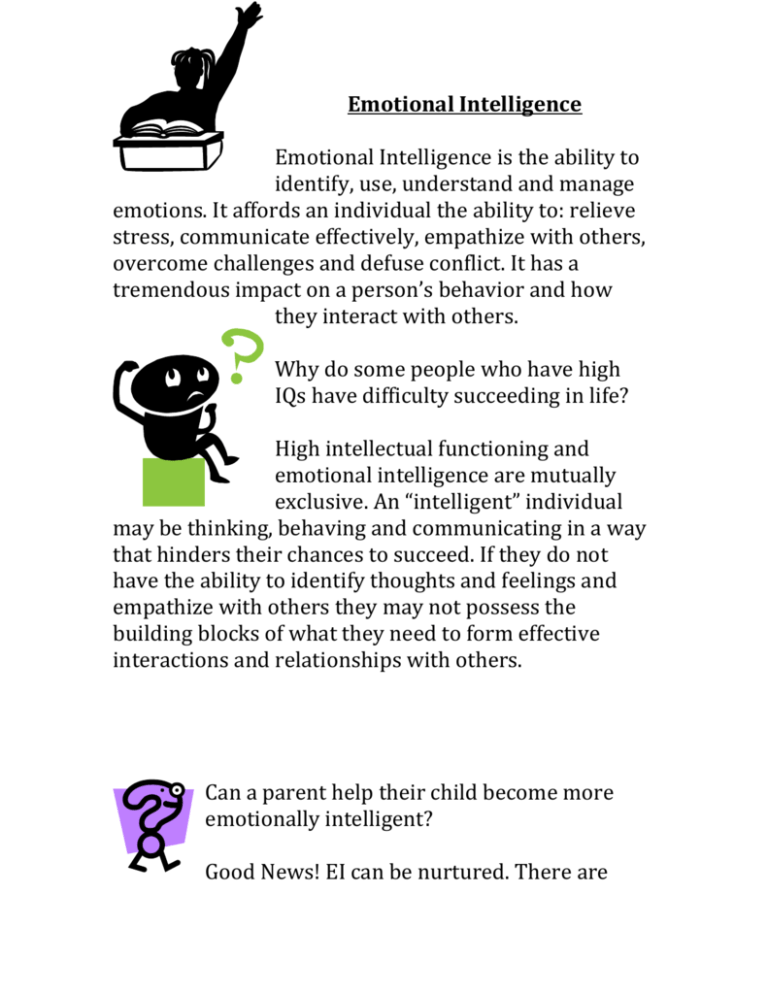
Emotional Intelligence Emotional Intelligence is the ability to identify, use, understand and manage emotions. It affords an individual the ability to: relieve stress, communicate effectively, empathize with others, overcome challenges and defuse conflict. It has a tremendous impact on a person’s behavior and how they interact with others. Why do some people who have high IQs have difficulty succeeding in life? High intellectual functioning and emotional intelligence are mutually exclusive. An “intelligent” individual may be thinking, behaving and communicating in a way that hinders their chances to succeed. If they do not have the ability to identify thoughts and feelings and empathize with others they may not possess the building blocks of what they need to form effective interactions and relationships with others. Can a parent help their child become more emotionally intelligent? Good News! EI can be nurtured. There are certain skills which can be taught to increase a child’s efficacy in this area. It should be noted that each individual’s make-up may determine the extent to which lessons can be incorporated. EI Developmental Expectations: Early Elementary- Children at this stage should learn to recognize and accurately label their emotions and how they lead them to act. Late Elementary- Lessons in empathy should enable children to identify the non-verbal cues to how someone feels. Middle School- They should be able to analyze what creates stress for them or what motivates their best performance. High School- They should be demonstrating the skills to listen and talk in order to resolve conflict instead of escalating ( doesn’t mean they will always do it) and have some skills to negotiate a win-win solution. Books to Help Kids Develop EI: The premier researcher in this field is Daniel Goleman and his book on the subject is called, Emotional Intelligence: Why it can matter more than IQ Children’s Books on the subject are: Feelings by Aliki When Sophie gets Angry- Really, Really Angry, by Molly Bang Story of My Feelings by Laurie Berkner The Way I Feel, by Janan Cain Series of books by Elizabeth Crary How Are You Feeling? By Saxton Freymann Today I Feel Silly, by Jamie Lee Curtis Mean Soup, by Betsy Everitt No Matter What, by Debi Gliori Stand Tall Molly Lou Melon, by Patty Lovell Two Monsters, by David Mckee Grody’s Not So Golden Rules, by Nicole Rubel Nurturing Emotional Intelligence 1. Acknowledge your child’s perspective and empathize. Helping them feel understood will help them let go of troubling emotions. You don’t have to agree, just acknowledge, “It’s hard for you…”, “ You are mad and hurt….” This supports EI because you are helping them with one of the fundamental building blocks which is the ability to identify their own feelings. Also children develop empathy by experiencing it from others. 2. Allow Expression. The fact that a youngster’s impulse-control circuitry has not ripened does not give a “pass” for misbehavior, BUT it does mean adults need to play a more active role in helping youngsters learn how to do the right thing. Instead of denying or minimizing the child’s emotion they need to be taught the full range of feelings is understandable and part of being human, even while some actions must be limited. This supports EI because it encourages a child’s ability to regulate their own emotions. It universalizes the child’s experience and helps them feel less isolated. 3. Listen to your child’s feelings. Breath through it, stay present, and resist the urge to make those troublesome feelings go away. This will help your child connect with their instinctive self-soothing techniques. “You seem so unhappy right now. Everybody gets upset sometimes…I’m right here. Tell me about it.” This supports EI because it shows the child that you are not overwhelmed with behavior that they are finding so scary. By helping them to feel safe we help them trust the process so they can handle their own emotions as they get older. 4. Teach problem solving skills. Children need to be taught skills to resolve how strong emotions make them feel. We can help them brainstorm ideas, practice their use and then support their utilization in real life. Children’s brains absorb lessons and when they are repeated, they shape the child’s brain. The more a child learns to delay gratification or impulse, the stronger the circuitry becomes. This supports EI because it teaches children to shift gears to find constructive solutions to problems. That takes practice and modeling on our part. Teaching kids to honor their feelings as signals about things they need to handle differently in their lives empowers kids. 5. Play it out. Use play with younger children, role playing with an older child to help break a negative pattern which is developing. This supports EI because emotionally healthy kids process feelings through play. Helping your child play out their big inner conflicts lets him resolve them so that they can move on to the next age-appropriate developmental challenge. They may be able to resolve things in play that they do not have words for.
